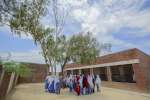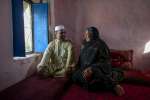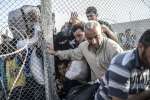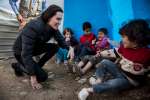- Text size
 |
|  |
|  |
| 
- Français
As number of refugee and migrant arrivals to Greece hits half a million, UNHCR warns of continued chaos unless reception in Greece strengthened and relocation expedited
Briefing Notes, 20 October 2015
This is a summary of what was said by UNHCR spokesperson Melissa Fleming – to whom quoted text may be attributed – at the press briefing, on 20 October 2015, at the Palais des Nations in Geneva.
As number of refugee and migrant arrivals to Greece hits half a million, UNHCR warns of continued chaos unless reception in Greece strengthened and relocation expedited
As number of refugee and migrant arrivals to Greece hits half a million, UNHCR warns of continued chaos unless reception in Greece strengthened and relocation expedited
In Greece, the number of sea arrivals this year has now passed the half-million mark with the arrival yesterday on the Aegean islands of nearly 8,000 people, bringing the total to some 502,500. The total number of arrivals so far in Europe via the Mediterranean is now over 643,000. The spike in arrivals in Greece is sharply increasing reception pressures on the islands. Many of the refugees and migrants are desperate to quickly move onwards, fearing that borders ahead of them will close. As of this morning, there were more than 27,500 people on the islands – either awaiting registration or onward transport to the mainland. Additional police had to be called in on Sunday and yesterday to control the chaotic situation.
It is of utmost importance here, as in other parts of Europe, that reception conditions be adequate to the task. Without this essential element, the relocation programme agreed by Europe in September is in serious peril and may fail.
After the chaotic and miserable scenes over the past few days, borders along the Balkan routes have reopened. On the Serbian border with Croatia, some 3000 people were left waiting amid uncertainty in the rain from Sunday until late Monday afternoon without shelter, and with minimal assistance on hand. UNHCR staff and staff of our partner organizations provided what support they could at such short notice including food, water, and blankets. But many people, including the elderly, pregnant women and several physically handicapped people, were soaked through and instances of hypothermia were reported. There was similar misery on the Croatia-Slovenia border.
And while conditions are still difficult in some places and there is a backlog, movement has resumed, with 4,300 people arriving in Austria from Slovenia yesterday. Meanwhile, in Austria and Germany, tens of thousands of refugees and migrants are sleeping in tents and temporary shelters because of accommodation shortages.
In the Aegean, we are saddened by the recent wave of deaths at sea among people crossing from Turkey into Greece. 19 people have died in the past 9 days in five separate incidents, almost half of these over the weekend. Infants and children were among those who have perished. Refugees we spoke to over the weekend told us that smugglers are offering discounts rates for crossings in bad weather and packing more people onto boats.
At least 123 people have died or gone missing in Greek territorial waters so far this year (in all, at least 3,135 have perished in the Mediterranean to date in 2015). We are concerned at the potential for this number to rise further as people try to beat the onset of winter and fears of new border-closures. UNHCR urges that search and rescue operations be further strengthened in this area to reduce risks.
To address the current situation in Europe, various measures of stabilization are needed in countries of first asylum and all countries of secondary movements to reduce irregular secondary movements. These measures include strong support to countries hosting the vast majority of Syrian, Iraqi and Afghan refugees, an information campaign informing of the dangers of the sea journey, and the development of legal pathways to seek protection in Europe. In countries of secondary movement in Europe, significant efforts must be made to develop a robust reception and registration capacity in order for the relocation programme to work.
For more information on this topic, please contact:
- In Athens (Regional), Ron Redmond on mobile +30 694 244 5037
- In Sofia, Boris Cheshirkov on mobile +359 878 507 041
- In Croatia (on mission), Céline Schmitt on mobile +33 623 16 11 78
- In Serbia, Melita Sunjic, on mobile +381 63 343 134
- In Geneva, Melissa Fleming on mobile +41 79 557 9122
- In Geneva, Adrian Edwards on mobile +41 79 557 9120
- In Geneva, William Spinder on mobile +41 79 217 3011

































